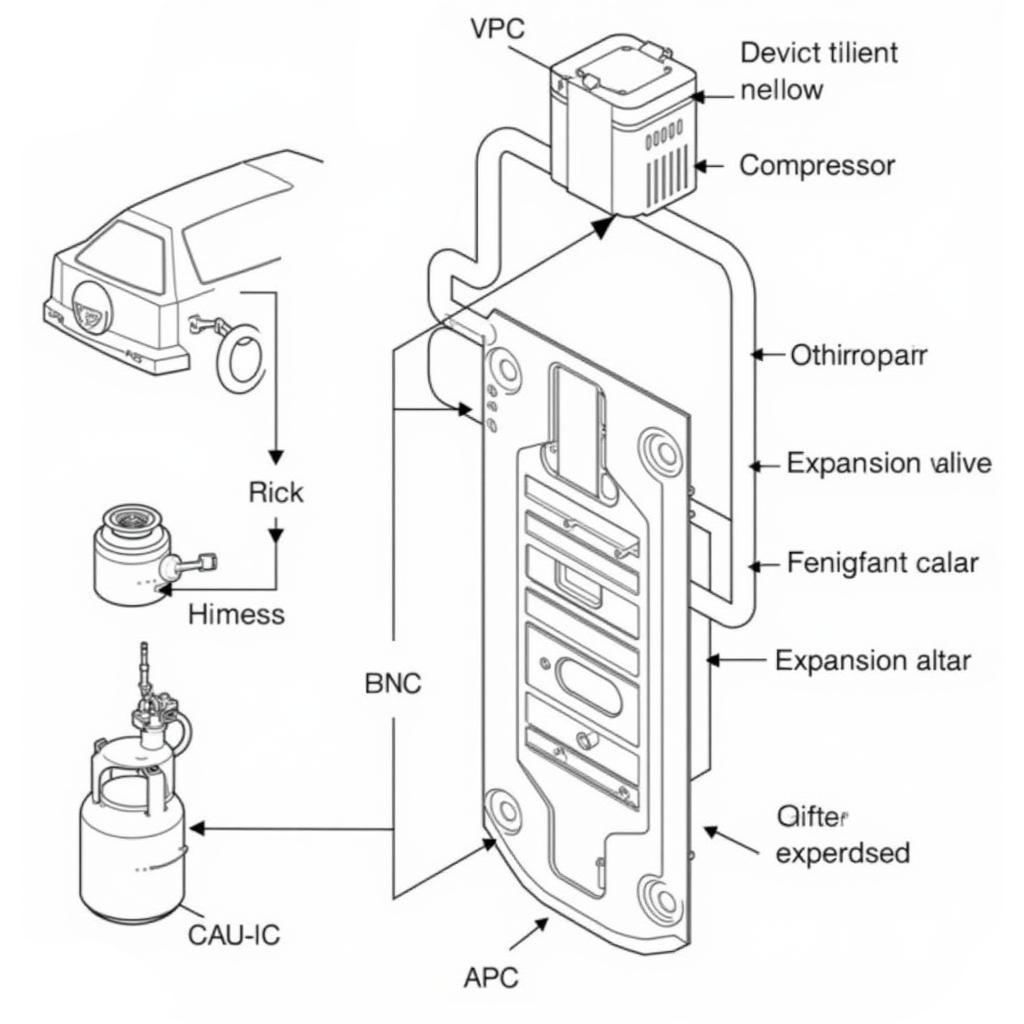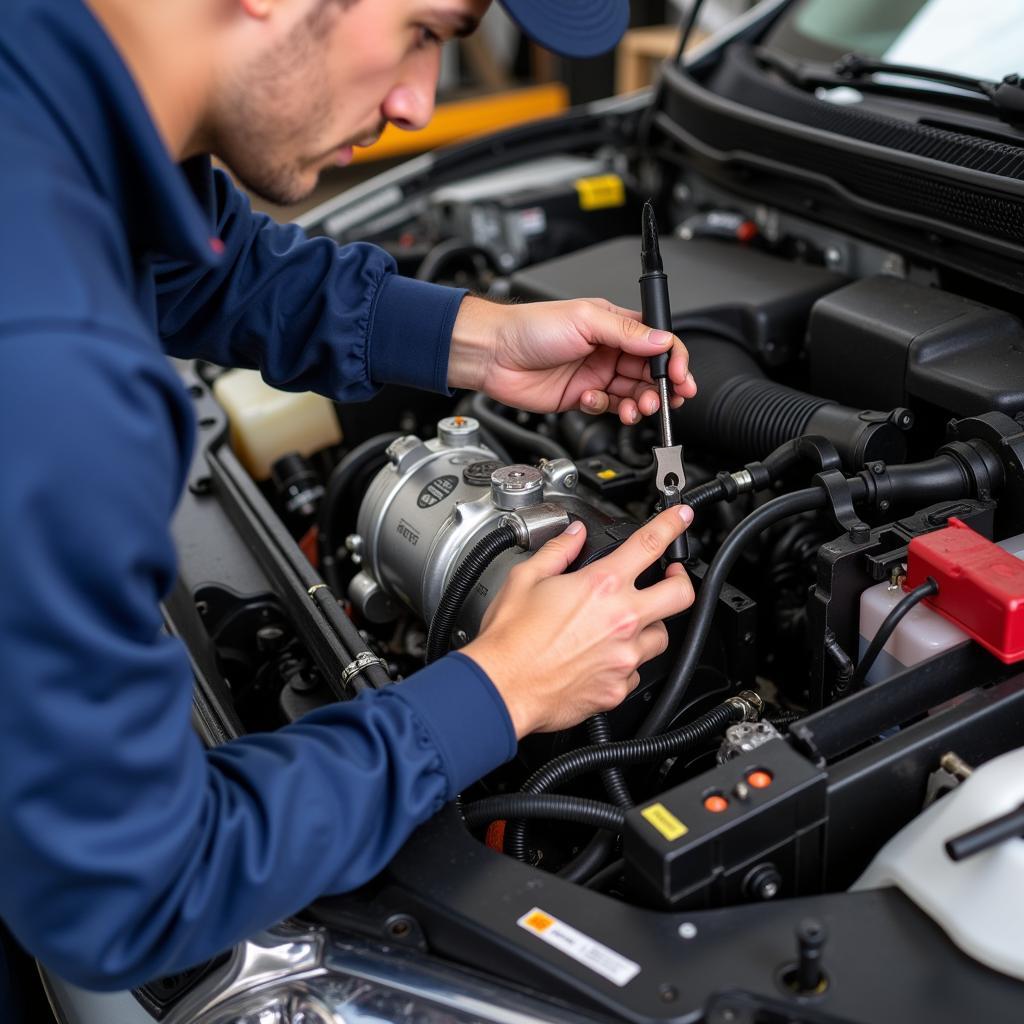Knowing when to fix your car AC compressor is crucial for maintaining a comfortable driving experience, especially during hotter months. A malfunctioning compressor can lead to warm air blowing from your vents, strange noises, and even complete AC failure. This article will guide you through the signs that indicate your car AC compressor needs attention. Let’s explore the common indicators, troubleshooting steps, and when professional help is required. You might be surprised to learn that sometimes a simple DIY fix is all you need. Check out our guide on DIY fix car ac.
Understanding Your Car’s AC System
Before delving into the specifics of compressor issues, it’s helpful to understand the basic components of your car’s AC system. The compressor is the heart of the system, responsible for compressing and circulating refrigerant. This refrigerant absorbs heat from the cabin air, allowing the system to cool the air blown through your vents. Other key components include the condenser, evaporator, expansion valve, and various hoses and connections. A problem with any of these components can affect the compressor and overall AC performance.
 Car AC System Components Diagram
Car AC System Components Diagram
Common Signs Your AC Compressor Needs Attention
Several telltale signs indicate a potential problem with your car AC compressor. Recognizing these early can prevent further damage and potentially save you money on repairs.
- Warm Air from Vents: The most obvious sign is warm air blowing from your vents when the AC is on. This often points to a compressor issue, especially if the air was previously cold.
- Loud Noises: Unusual noises like clicking, grinding, or whining coming from the engine compartment, particularly when the AC is engaged, can signal a failing compressor clutch or internal compressor damage.
- Leaks: Refrigerant leaks can lead to reduced cooling performance and can damage the compressor. Look for oily residue around AC components or a sweet smell inside the car. If you suspect a leak, finding a reliable place to get your ac fixed is crucial.
- System Cycling On and Off: If the AC system cycles on and off rapidly, it could indicate a problem with the compressor’s ability to maintain pressure.
- Electrical Issues: Problems with the compressor’s electrical connections or clutch can prevent it from engaging, resulting in no cold air.
Troubleshooting Your Car AC Compressor
Before assuming the compressor needs replacement, there are a few troubleshooting steps you can take.
- Check the Fuses and Relays: Begin by checking the fuses and relays related to the AC system. A blown fuse or faulty relay can easily disable the compressor.
- Inspect the Drive Belt: Ensure the drive belt that powers the compressor is properly tensioned and not damaged. A loose or broken belt will prevent the compressor from operating.
- Check for Refrigerant Leaks: If you suspect a leak, consider using a leak detection kit or consulting a professional to pinpoint the source and repair it. If you’re handy, you can explore options to fix an AC leak inside your car.
When to Seek Professional Help
While some AC issues can be addressed with DIY fixes, others require professional expertise. If you’re uncomfortable working on your car’s AC system or the problem persists after basic troubleshooting, it’s best to consult a qualified mechanic. They have the tools and knowledge to diagnose complex issues and perform necessary repairs. You can find out the cost to fix a car AC compressor fan to get an idea of potential expenses.
“A properly functioning AC system is essential for driver comfort and safety, especially in extreme temperatures,” says John Smith, a certified automotive technician with over 20 years of experience. “Don’t hesitate to seek professional help if you suspect a problem with your AC compressor.”
Should I Replace or Repair My AC Compressor?
Deciding whether to repair or replace your compressor depends on the extent of the damage and the overall cost. In some cases, replacing individual components within the compressor, such as the clutch, might be a viable option. However, if the compressor has suffered internal damage or is significantly worn, replacement is often the most cost-effective solution.
 Replacing a Car AC Compressor
Replacing a Car AC Compressor
Conclusion
Knowing when to fix your car AC compressor involves recognizing the key signs of a malfunction, such as warm air, unusual noises, and refrigerant leaks. While some troubleshooting can be done at home, seeking professional help is often necessary for accurate diagnosis and repair. A functioning AC system is essential for comfortable driving, so addressing compressor issues promptly is crucial. Contact AutoTipPro at +1 (641) 206-8880 or visit our office at 500 N St Mary’s St, San Antonio, TX 78205, United States for expert advice and assistance with your car AC needs.
 Modern Car AC Controls
Modern Car AC Controls
“Regular maintenance, including checking refrigerant levels and inspecting the system for leaks, can help prevent compressor problems and extend the life of your car’s AC system,” adds Jane Doe, a seasoned automotive engineer. Don’t wait until your AC fails completely to address potential issues.





Leave a Reply